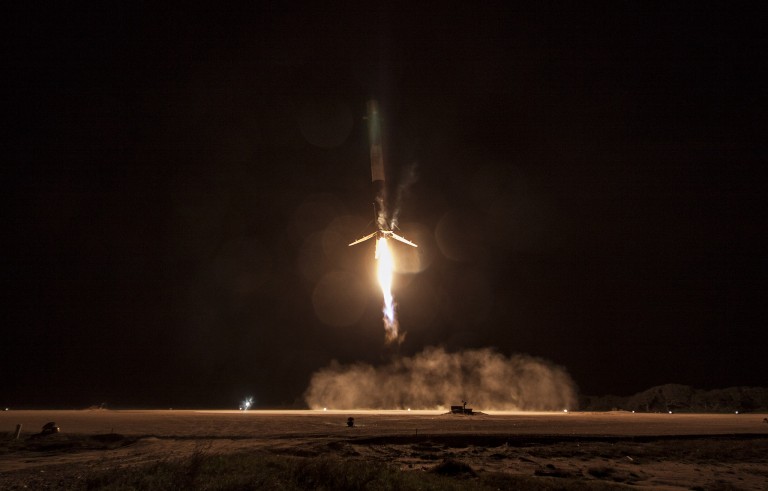(单词翻译:单击)
JUDY WOODRUFF: It's been a long time since a rocket's descent has been big news, but, last night, there was a historic landing. After SpaceX, a private company founded by Elon Musk, launched a rocket on Monday from Cape Canaveral in Florida, it stuck the landing, you might say. The rocket booster landed gently on Earth, a feat cheered at SpaceX headquarters, and that suggested we may be able to create reusable rockets to explore further.
Our science correspondent, Miles O'Brien, joins me now. Welcome, Miles. So, how big a deal is this?
MILES O'BRIEN: Judy, this is the Holy Grail for space.
Ever since the space age began, those of us who cared about exploring beyond have thought, wouldn't it be nice if we could reuse the craft? We have been throwing them away virtually the whole time. The space shuttle was an attempt to make it reusable. Didn't work out so well.
And so the idea that you could take the first stage of a rocket, kind of the money end of the rocket, if you will, and have it land intact gently to be fueled up, gassed up and launched again is truly a great moment. So, yes, big deal.

JUDY WOODRUFF: Why was it so hard to do before now?
MILES O'BRIEN: Well, part of it is, we didn't try for a long time. During the heady days of the space race, we were too busy trying to beat the Soviets to the surface of the moon, and so we were very happy just to throw things away, rather than try to figure this out.
There is a penalty. You have to have extra fuel on obviously to bring it down safely. Then we got kind of off on a tangent with the space shuttle, thinking that would be reusable, and that didn't work out so well. So we sort of didn't think about it.
Then we went in the wrong direction. And now with entrepreneurs like Elon Musk and Jeff Bezos looking at this idea in a more bottom-line manner than NASA would, dare I say, we might get some progress.
JUDY WOODRUFF: So, now, does this mean it's easy to do that, to land a rocket back on Earth?
MILES O'BRIEN: Nothing in space is easy.
And this is like balancing a broom pole on your nose, and only harder, lots harder. So, yes, it's been proven now. The trick is, if you really want to make it cost-effective, you have to do this a lot, because, frankly, if you're only going to launch a few times a year, you might as well just throw away the pieces.
But if you're really going to ramp up and think about accessing space on a routine basis, having reusable first stages, having reusable pieces of these rockets really becomes a game-changer.
JUDY WOODRUFF: So what does it mean for the future of spaceflight? What does this mean that can now be attempted that looked a little farther off in the future until now?
MILES O'BRIEN: Yes, well, this will — look, on the big picture here, what we're seeing here is low Earth orbit changing dramatically. It's not unlike what happened with the Internet, built by the government, handed over to Silicon Valley, and, poof, we get Facebook and Instagram. Kind of like that anyhow.
Now what we're seeing in space is, NASA is stepping out of low Earth orbit and is handing over that domain to the likes of Elon Musk and Jeff Bezos and Richard Branson, who are trying to make businesses out of this. And that's exciting. It means NASA can use its limited resources to do what it should do, go over the hill to the next horizon. In this case, I would like to see them go to Mars. And that's where they say they're headed.
They need the funding to do that. They need the focus. And they don't need to be spending a lot of time flying taxis and freighters into low Earth orbit. Instead, there are private companies that are willing to do it, and they're doing it faster, better and cheaper.
JUDY WOODRUFF: So you mentioned these other entrepreneurs who are trying, Jeff Bezos, who has his own company. They landed — I guess they landed a rocket recently had been in suborbital — had been in suborbit, whatever the term is, but — so you have this competition. What does that mean for the future? Does that mean we're likely to see more attempts like this?
MILES O'BRIEN: Competition is always good. It's what got us to the moon, after all.
When we lost that space race, NASA kind of got lost in space, if you will. Now that we have viable, private enterprise competing and getting into Twitter wars over who is doing a better job of it, frankly, which is very entertaining to see billionaires go at it on Twitter, when you see that kind of thing, that's really exciting. That means that there might be a real business here.
JUDY WOODRUFF: Suborbital flight was what I was trying to say.
Miles O'Brien, space is getting exciting all over again.
MILES O'BRIEN: Yes, indeed, suborbital or orbital, Judy.
JUDY WOODRUFF: Thank you.
MILES O'BRIEN: You're welcome.


